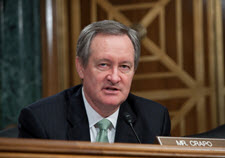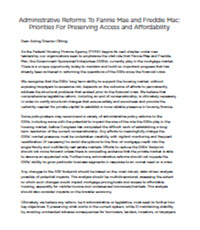
The Senate Banking Committee’s September 10 hearing on “Housing Finance Reform: Next Steps” focused on the Trump Administration’s efforts to reform the U.S. housing finance system, including their proposal to overhaul the Government-Sponsored Enterprises (GSEs) Fannie Mae and Freddie Mac.
- Treasury Secretary Steven Mnuchin testified before the committee about the Administration’s Housing Reform Plan released last week to revamp and recapitalize the GSEs before releasing them from conservatorship. The Administration’s goal is to reduce the federal government’s footprint in housing finance, increase the role of the private sector and private capital in the market and, eventually, return Fannie Mae and Freddie Mac to private shareholder ownership. Mnuchin testified that if Congress fails to act, the Administration will pursue an agreement with the GSEs’ regulator, the Federal Housing Finance Agency (FHFA) to change the terms of the government’s bailout agreements reached 11 years ago.
- The FHFA announced today a revised cap structure on the multifamily businesses of Fannie Mae and Freddie Mac. The new multifamily loan purchase caps will be $100 billion for each organization, a combined total of $200 billion in support to the multifamily market, for the five-quarter period Q4 2019 – Q4 2020. The new caps are significantly higher than the existing ones and apply to all multifamily business – no exclusions. To ensure a strong focus on affordable housing and traditionally underserved markets, FHFA directs that at least 37.5 percent of the Enterprises’ multifamily business be mission-driven, affordable housing.
- After Fannie and Freddie received $191 billion in government support during the financial crisis of 2008 and entered conservatorship, they have become profitable. Under the Administration’s plan, Fannie and Freddie profits would no longer go to Treasury, but would be dedicated to building their capital bases. (Wall Street Journal, Sept. 10)
- Mnuchin also testified that Treasury’s plan “would preserve the longstanding government support of the 30-year, fixed-rate mortgage loan.” The Treasury plan acknowledges the disincentives posed by regulatory barriers such as rent control and calls for enhancing private involvement in multifamily lending by refocusing the GSEs on affordable and workforce housing.
- Democratic senators clashed with Republicans during Tuesday’s hearing, emphasizing the reform outlines would raise home borrowing costs and neglect lower-income homeowners. Sen. John Kennedy (R-LA) called for a specific Administrative proposal, stating, “This whole thing is a car wreck. It’s a dumpster fire…We spent $190 billion of taxpayer money, and we’re in worse shape.” (AP, Sept. 10)
- The Roundtable submitted comments this week in advance of the hearing (Roundtable letter, Sept. 9). The Roundtable and 27 industry organizations also submitted principles for reforming the GSEs in March. (Roundtable Weekly, March 1)
The path to reaching bipartisan consensus on housing finance reform remains unclear, especially before the 2020 presidential election. Housing finance reform will be a focus of discussion with Housing and Urban Development (HUD) Secretary Ben Carson during The Roundtable’s Fall Meeting on October 30 in Washington.
# # #

